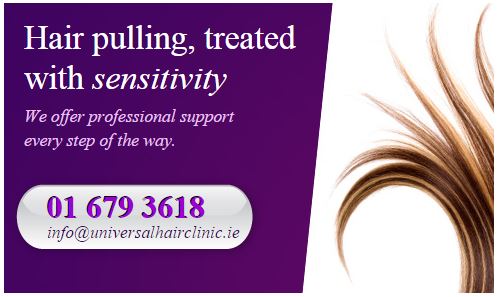How Common Is Trichotillomania?
Trichotillomania is on the increase, with more cases reported on an annual basis. Studies show that around 4 per cent of the world’s population compulsively pull out their hair – mostly from the scalp, eyelashes or eyebrows. However, experts believe that the number of people with trichotillomania is severely underestimated because many opt not to get professional help.
Sufferers often experience shame and guilt for pulling their hair, suffering silently and feeling terribly isolated for many years before seeking treatment. They typically engage in this behaviour privately, which is why their loved ones aren’t aware of it until the effects become noticeable.
It also does not help that there continues to be a stigma around hair loss and mental or psychological disorders like trichotillomania. This makes sufferers even more apprehensive about coming out and getting treated. They fear that they will get ostracised or judged.
 Universal Hair & Scalp Clinic provide a safe space where people with trichotillomania can get the treatment they need to overcome this disorder. If you are worried that you might have this condition, please do not hesitate to contact us. You can count on our staff to keep things confidential and provide immediate assistance.
Universal Hair & Scalp Clinic provide a safe space where people with trichotillomania can get the treatment they need to overcome this disorder. If you are worried that you might have this condition, please do not hesitate to contact us. You can count on our staff to keep things confidential and provide immediate assistance.
Who Is at Risk for Trichotillomania?
This impulse control disorder can affect people of all ages. However, it tends to be more common in children and adolescents. Typically, the most severe cases are noted in people aged 10 to 13. Hair pulling may also affect infants, but this is often mild and temporary.
In children, trichotillomania equally affects girls and boys. Meanwhile, in adults, it is more common in women than in men.
According to studies, 9 out of 10 reported cases involve women. Another research found that women are 5 to 10 times more likely than men to engage in hair pulling. But researchers do not discount the fact that the lower reported cases in men could be because many of them choose not to get treatment.
Some people may pull hair during one period in their lives, only to stop doing it as quickly as it started. However, for many others, it is a recurrent problem that may become severe and lead to complications if left untreated.
Having a close relative with trichotillomania also increases one’s chances of suffering from the disorder. Experiencing extreme stress also increases the risk of hair pulling. Studies also show that people with psychological or mental health issues like eating disorder, personality disorder, and depression are more likely to suffer from trichotillomania.
What Can Be Done About Trichotillomania?
Are you pulling your hair repeatedly? Or do you think a loved one is suffering from trichotillomania? Please know that help is available in Ireland for people with hair pulling disorder.
Qualified specialists at the Universal Hair & Scalp Clinic can diagnose the condition and create a treatment plan. As a registered care provider of the Trichotillomania Learning Centre, our clinic is committed to providing a safe place for sufferers to get the help they need. You can count on our discreet and compassionate staff to provide effective treatments not just for trichotillomania but also for other hair-related issues like balding that come with this disorder.
Are you unable to resist the urge to pull out your hair? Has this resulted in hair thinning or bald patches? Please know that we are here to help you overcome trichotillomania and treat your hair loss. Call us on 01 6793618 to schedule a consultation with our specialist.
